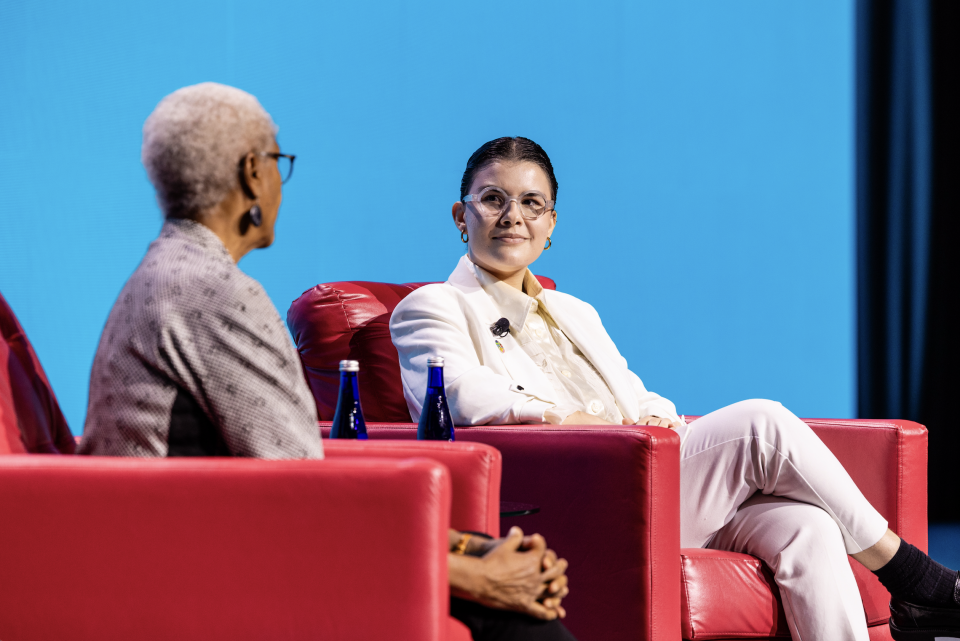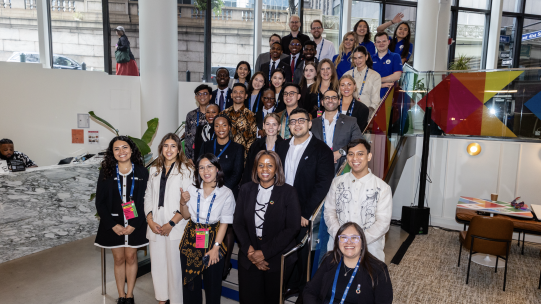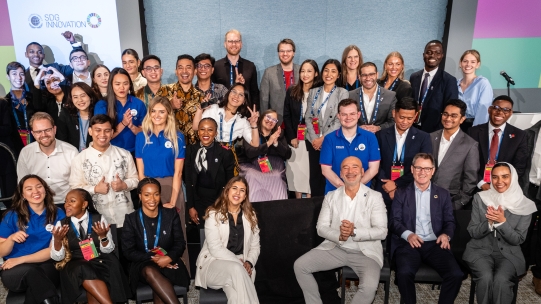Young leaders shaping the PRESENT: Rethinking education for impact
Read more

Conversations about young people tend to focus on how they will shape the future. But Luísa Franco Machado, a Young Leader for the Sustainable Development Goals (SDGs) at the United Nations, offers a fresh perspective.
Luísa points out that young people aren’t just future leaders—they’re already playing a significant role in shaping our present.
It’s a meaningful shift in mindset: instead of viewing emerging leaders as “leaders in the making,” we can start recognizing them as active drivers of change today alongside their more established peers.
Hear more from Luísa Franco Machado below as she shares her insights on how we can rethink the influence of rising leaders in today’s world.
The role of young people in shaping the present
Young people are not just the future—they are shaping the present. Around the world, young leaders are stepping up as climate advocates, artists and policymakers, driving social change in innovative and impactful ways.
Luísa Franco Machado, highlights the urgent need to rethink education to better equip young people for leadership for today and tomorrow.
The common narrative often positions young people as the leaders of tomorrow, but they are already making a difference today. Young changemakers are pioneering solutions to current challenges, reshaping policymaking and expanding who participates in these discussions. Their work spans diverse fields, from climate leadership to digital rights and social advocacy. The United Nations Global Compact encourages businesses to engage with young leaders to drive sustainable change, aligning their innovative approaches with corporate responsibility. Ensuring that young voices like Luísa’s are heard provides an opportunity to ensure sustainability efforts are inclusive, diverse and action-oriented.
Reimagining education for impact
Education plays a crucial role in shaping how young people engage in leadership. Moving beyond traditional learning methods and embracing innovative teaching approaches can help to fully harness the potential of young people. In fields like digital development, education should not just focus on technical STEM skills but also provide training in advocacy and policymaking, for example. Equipping youth with public speaking skills, negotiation and policy-bridging skills fosters more effective leadership.
The UN Global Compact promotes corporate engagement in education initiatives, urging businesses to support youth leadership programs that integrate sustainability principles. As companies and policymakers rethink education, integrating sustainability into curricula ensures that young leaders are prepared to champion overarching perspectives like the Sustainable Development Goals (SDGs) and implement real-world solutions that benefit society as a whole.
Learning by doing: The power of experiential education
Many young leaders learn how to advocate for change through firsthand experience rather than formal education. Engaging with the United Nations and other advocacy platforms provides invaluable learning opportunities, allowing young people to acquire the skills they need through direct involvement.
Integrating advocacy training into school curricula could be transformative, preparing young people to use their knowledge for tangible impact.
The United Nations Global Compact’s youth initiatives encourage direct engagement, helping young leaders navigate real-world sustainability challenges. Businesses have a role to play in this experiential learning model by providing mentorship, internships and leadership programs that empower young advocates. By fostering these opportunities, companies can directly contribute to SDG 4 (Quality Education) and SDG 8 (Decent Work and Economic Growth), reinforcing their commitment to sustainable development.
Conclusion: Building a future through action today
To truly empower young leaders, we must rethink how we educate and support them. By fostering innovative learning experiences and prioritizing real-world advocacy skills, we can create a generation that is prepared for the future and actively shaping it now. Young leaders are critical to achieving the SDGs, and collaboration between the private sector, policymakers and educational institutions will accelerate progress. The UN Global Compact continues to amplify young voices, ensuring that youth perspectives are embedded in corporate sustainability efforts and global decision-making.
Call to Action
How can businesses, policymakers and educators better support young leaders today? Join the conversation and explore ways to integrate youth leadership into decision-making processes for a more sustainable and inclusive future.


